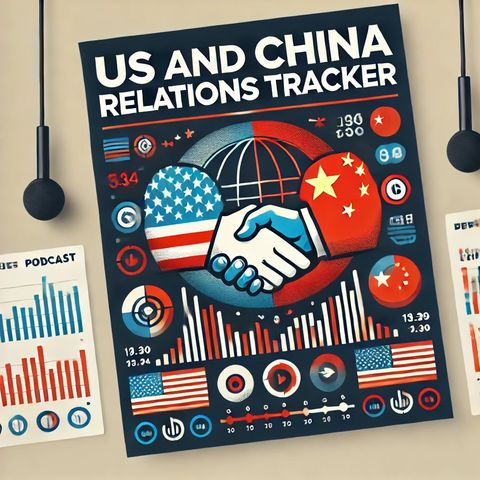Navigating the Geopolitical Complexities: UN Resolution 2758 and the Future of US-China Relations

Iscriviti gratuitamente
Ascolta questo episodio e molti altri. Goditi i migliori podcast su Spreaker!
Scarica e ascolta ovunque
Scarica i tuoi episodi preferiti e goditi l'ascolto, ovunque tu sia! Iscriviti o accedi ora per ascoltare offline.
Navigating the Geopolitical Complexities: UN Resolution 2758 and the Future of US-China Relations
Questa è una trascrizione generata automaticamente. Si prega di notare che non è garantita la completa accuratezza.
Descrizione
In recent years, the geopolitical landscape has witnessed intensified scrutiny and debate over UN Resolution 2758, a pivotal factor in US and China relations. This resolution, passed in 1971, recognized...
mostra di piùAcademic Hao Nan posits that the historical manipulation and interpretation of Resolution 2758 have created a multifaceted geopolitical chess game, with China steadfastly asserting its "One China" policy. This policy underscores Beijing's claim that Taiwan is a part of its territory, a stance that has unequivocal implications for international diplomatic relations and strategic alignments.
The United States, maintaining a position of strategic ambiguity, has traditionally supported Taiwan diplomatically and militarily, without officially recognizing it as a sovereign state separate from China. This approach is calibrated to deter both unilateral changes to the status quo from Beijing and a formal declaration of independence from Taipei. However, the situation has become increasingly nuanced as the global community’s perspectives on Taiwan evolve.
A growing number of countries and voices within international circles are raising questions about the legitimacy and applicability of Resolution 2758 to Taiwan's contemporary status. These critiques suggest that the resolution was intended solely to address China’s seat in the UN, not to determine the status of Taiwan, thereby implying that Taiwan’s future should be decided by its own people through peaceful and democratic means. This sentiment is contributing to a more pluralistic dialogue on Taiwan’s status in the context of global diplomacy.
Moreover, Beijing’s assertive foreign policy, marked by economic and military expansion, has driven some nations to reconsider their stance on the Taiwan issue. The PRC’s construction of military installations in the South China Sea and its ongoing military drills around Taiwan have amplified concerns about regional security and the need for a multipolar balance of power, further complicating the resolution’s application.
Amidst these dynamics, the US remains a pivotal player. While adhering to the “One China” policy, Washington has increased its support for Taiwan through arms sales and high-level visits, signaling a continued commitment to ensuring its democratic governance and security. This dual approach plays a crucial role in ensuring that Taiwan remains an integral element of Indo-Pacific strategies aimed at countering Chinese influence and supporting freedom of navigation.
The ongoing debate surrounding UN Resolution 2758 is more than a historical quandary; it is a reflection of the current geopolitical challenges and the shifting alliances worldwide. As China continues to rise as a global power, how nations navigate the intricate web of diplomacy regarding Taiwan will significantly impact US-China relations and shape the future of international order.
In conclusion, revisiting and debating the relevance of Resolution 2758 aligns with broader global calls for clarity regarding Taiwan’s status and the need to uphold international norms and democratic resolutions. This discussion may ultimately redefine the parameters of sovereignty, self-determination, and international recognition in the 21st century geopolitical milieu.
Informazioni
| Autore | QP-4 |
| Organizzazione | William Corbin |
| Sito | - |
| Tag |
Copyright 2024 - Spreaker Inc. an iHeartMedia Company
